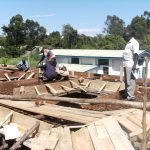After we finished filming the documentary, Senior Chief Kachindamoto called me aside.
“My son” she said, “what real change will this film bring, how will it help me? You are my fellow Malawian.”
She looked straight into my eyes with an expression that showed real concern. For a moment, I paused, searching for truth in my reply. Then I said:
“The world will know about the great work you are doing. And who knows, perhaps it will draw many people who will come to support your cause.”
A knowing smile touched her lips.
“So, you say your friends are from America?”
“Yes,” I answered.
“And what do they want to do with this film?”
“They want to show it in many places, take it far, and create greater awareness of your work.”
“My son,” she said again, repeating the words, “you are my fellow Malawian. You must know that you are not the first to come here and make films with foreigners. Many have come before, from the BBC, Al Jazeera, and other countries far away. But few of them truly came with the heart to help. Most only filmed me so that they could gain fame or make money from the work I am doing.”
“I hear you mother,” I replied.
“There is something I have long wanted to do,” she continued. “I have spoken to many people, lawyers, ambassadors, and others, but none has ever helped me. For years. Yet you look like someone who can. I have wanted to register an organisation, to make my work official. Can I entrust you with this task?”
That was the very first time I met Senior Chief Kachindamoto. But from that day forward, she trusted me deeply, believing I had the ability to help her. I never knew exactly what she saw in me. Yet I was not entirely surprised, for it was not the first time in my life that people had chosen to trust me simply by looking at me. In the past, I used to be puzzled by this, wondering what it was that others saw in me, until I came to realize that it was a gift, one not to be taken lightly.
After all the filming, she invited us to her home. I was there with filming crew who had come to shoot the film The Bride Price, in which I had been privileged to serve as director.
When we had finished eating, she brought me an envelope and handed it to me.
“The constitution of our organization,” she said. “Everything we wrote is in there. Please guide me on what to do next. Take it.”
When I opened it, I found documents that she and others, including lawyers, had signed in pen, showing that they were originals and not photocopies.
“I cannot take these,” I told her. “They look like signed originals. Give me photocopies instead.”
“I trust you, my brother,” she replied.
“Perhaps I can just scan them rather than keep them,” I suggested.
“I have others,” she said. “Take these.”
I was reluctant, but from that day, she made me one of the few people she would call from time to time. Sometimes I called her, and whenever she answered, she poured out her heart about her mission to protect girls. For her, it was never about films or stories in books. It was about the calling God had placed on her heart, and she knew it was from Him.
She often said that when her life on this earth ended, she would be content, knowing that the one assignment God had entrusted to her, to rescue girls, she had fulfilled with faithfulness and joy.
In her lifetime, she saved thousands upon thousands of young girls. Her work remains with us to continue. Her life remains with us to be a light. And her memory must remain ever before us.
Her passing leaves us in great orphanhood. Yet I pray that, as a nation, we may recognize that her sacrifices were not in vain, and strive to bring her vision to completion.
Go well mother, as you join the ancestors who went before us.
Rest in Power, gogo.
This post was created with our nice and easy submission form. Create your post!



